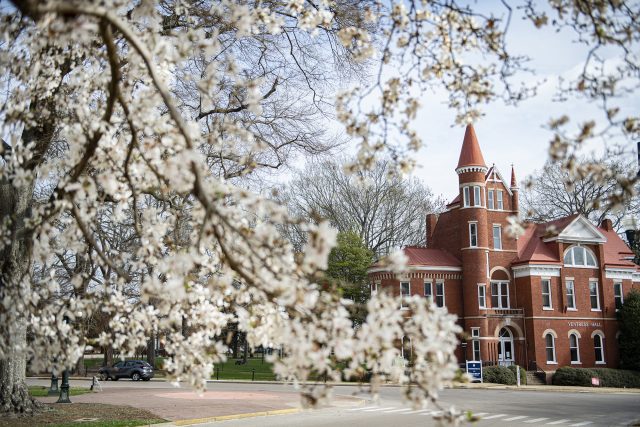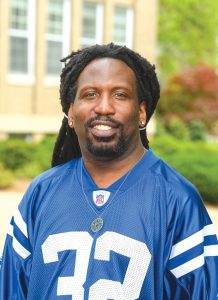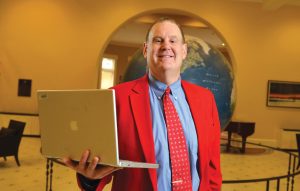
Three College of Liberal Arts professors at the University of Mississippi were recently recognized for their superior teaching. Photo by Logan Kirkland/ Ole Miss Digital Imaging Services
OXFORD, Miss. – The University of Mississippi College of Liberal Arts recognized three professors for superior teaching at the end of the 2021 spring semester.
Jason Solinger, associate professor of English, is the Howell Family Outstanding Teacher of the Year. Named after alumni donors Dr. Norris Howell (BS 75) and Lynne Thomas Howell (BA 74, MBA 76) of Ripley, the endowment provides funds to recognize the outstanding teacher within the College of Liberal Arts.
Mervin Matthew, instructional associate professor of psychology, is the Outstanding Instructor of the Year, and Neil Manson, professor of philosophy, received the Cora Lee Graham Award for Outstanding Teaching of Freshmen.
“Drs. Solinger, Matthew and Manson represent everything good about teaching at the university,” said Donald L. Dyer, associate dean for faculty and academic affairs and distinguished professor of modern languages.
“Their excellence of class instruction, intellectual stimulation of students and concern for students’ welfare are evident in the classroom and in the nomination letters of support from students and colleagues for the award.
“We are thrilled to add these exceptional educators to our long list of distinguished and influential teachers in the College of Liberal Arts. They are true gems of the university community, and we are extremely proud of them.”
Solinger’s goal in teaching literary studies is “instilling in my students a love of books and an intellectual curiosity that will keep them reading.
“I try to make learning fun, and I care about the whole person,” Solinger said. “On my best days, I’m teaching with humor and maybe ridiculously over-the-top enthusiasm. Always, I want my students –really, all of them – to do really well. So I design my classes so that students with different learning styles and skills can master the material one way or another.
“What happens outside the lecture hall or seminar room is just as important. My office is always open to students, and I encourage them to come see me if they are encountering difficulties with the class, with college, with life. I want them to know that I am someone who is ready to help them identify the university resources and personnel that can help them get to where they need to go.”
He succeeds in his attempts. “The most enthusiastic English teacher I’ve ever had” exemplifies Solinger’s reviews.
Having already mastered online instruction – he won the 2019 Paragon Award for Distance Teaching – Solinger “sought to inspire students by ‘upping his game’ with creativity and ingenuity during the COVID-19 pandemic,” a colleague said.
One pupil noted Solinger’s work to find texts “relevant in our contemporary time period to help look at current events with critical thinking and understanding.”
His “organic perspective on the body of literature that he teaches entails actively considering how students will take their academic work beyond the classroom,” a colleague said. “On behalf of our English majors, Jason has organized and run various career-oriented events and reached out to our alumni to cultivate networking opportunities for our graduates.”
For more about Solinger, read his Q&A on the college website.
Matthew uses a conversation he had with a former statistics student to describe his experience as a psychology professor.
“When she commented on never mastering our subject, this was my reply: ‘No one who’s ever lived mastered it. We’re all just at different stages of learning.’ That quote does a good job of summing up how I view education, and I think it fits well with the spirit of this award.”
Matthew is the “heart of our curriculum,” a colleague said. He provides the essential foundation for all majors’ understanding of psychology as a science and the foundation for their success in upper-division courses.
“Dr. Matthew is central in enabling the department to deliver our core curriculum, and he does so in a way that both challenges and supports students early in their undergraduate career,” his colleague said.
“Students flock to his classes. Dr. Matthew draws students into the major through his commitment to excellence in teaching and their welfare.”
Reviews capture his enthusiasm for the subject and his ability to draw students into the material. One student who became a psychology major because of Matthew’s course called him a “gateway drug to psychology.”
For more about Matthew, read about him on the psychology website.
Manson’s teaching philosophy during the pandemic illustrates what a colleague calls an “incredibly impressive and student-oriented” approach – developing an outdoor teaching plan, designing an impromptu classroom in the Circle (including carting a flip chart to write on), and making creative use of technology to ensure students could hear and have discussions.
“The transition to remote, online instruction forced upon us suddenly by COVID-19 in March 2020 was very difficult on students,” Manson said. “Through no fault of their own, they did not get the full educational experience they deserved. I wanted to make up for that in the 2020-21 academic year.
“My goal was to maximize in-person instruction, even for the one hybrid class I taught in the fall. We started off the fall having all classes outdoors and continued with that until the quarantining settled down, at which point we moved indoors.
“Students who couldn’t make it in person were able to listen to everything using Discord, and I was able to share with them all the lecture outlines I was writing on my flip chart.
“The end result was a classroom experience that was mostly normal. That’s all I was aiming for – a normal learning experience for the students. They were great about it, and I’m thankful for them.”
Known for consistently inspiring students while maintaining high standards in introductory, upper-division and graduate classes, Manson receives glowing praise for explaining “the concepts in approachable terms” and making logic “fun.”
His textbook “This Is Philosophy of Religion: An Introduction,” published this year by Wiley Blackwell, draws on years of successful teaching.
For more about Manson, see his Q&A on the college website.
The three teaching awards carry prizes of $1,000, and the recipients’ names are added to commemorative plaques in the Dean’s Office. Visit the College of Liberal Arts Teaching Awards webpage to read more about the awards and past winners.


